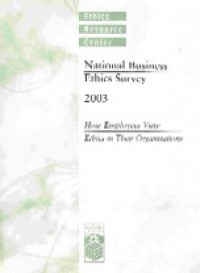
National business ethics survey 2003 : how employees view ethics in their organizations
| Gmd : Text
| Availability :
| 00000009434 | HF5387 .N52 2003 | (Text Book) | Available - Ada |
The 2003 National Business Ethics Survey (NBES) asked employees in the 48 contiguous states to share their views on ethics and compliance within their organizations. The broad concept of business ethics may defy easy summary, but the survey questions in this third NBES report are specific and focused. They combine to yield answers on matters relating to how employees distinguish right from wrong behavior in their work, the availability of resources to aid in making appropriate decisions, and the general practice of values like honesty and respect in their organi- zations. More specifically, the survey of 1,500 participants focused on a number of key areas including:
.Ethics practices of executives, supervisors and coworkers; .Prevalence of formal ethics programs;
.Pressures to compromise ethics standards;
.Misconduct at work and the influences on reporting it; .Frequency with which certain ethical values are
practiced; and
.Accountability for ethics violations.
Context is critical in any survey. To make better sense of survey findings and trends in business ethics, we look first to the larger business environment. The years between the 2000 and 2003 surveys have brought the end of the dot.com boom, a sizable downturn in the economy and, beginning with Enron, a series of well-publicized scandals among major corporations and non-profit organizations. New and emerging legislation and regulations, including the Sarbanes-Oxley Act of 2002 and Securities and Exchange Commission (SEC) regulations are placing addi- tional emphasis on executive conduct and organizational standards and practices. These events are of course related and together form a backdrop for the findings we present.
Given these developments, we might expect employees in 2003 to be more aware of business ethics than in previous survey years. We might also expect business leaders to focus more attention on issues and concerns relating to ethics. But to what effect? Are negative events in business simply mirrored in how employees view the conduct of their leaders and assess their organizations? Or can corpo- rate scandals in particular have the opposite effect -pro- viding both the impetus for change and making employees' own organizations look better by comparison?
The answers from the survey are clear and compelling. Recent negative events have not resulted in employees' viewing busi- ness ethics in their own organizations more negatively.
Though major vulnerabilities and challenges remain, findings from the 2003 NEBS are surprisingly hopeful.
| Series Title |
-
|
|---|---|
| Call Number |
HF5387 .N52 2003
|
| Publisher Place | Washington DC |
| Collation |
vi, 68p.; 30cm.
|
| Language |
English
|
| ISBN/ISSN |
0916152049
|
| Classification |
HF5387-5387.5
|
| Media Type |
-
|
|---|---|
| Carrier Type |
-
|
| Edition |
-
|
| Subject(s) | |
| Specific Info |
-
|
| Statement |
-
|
| Content Type |
-
|
No other version available







